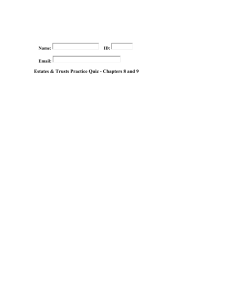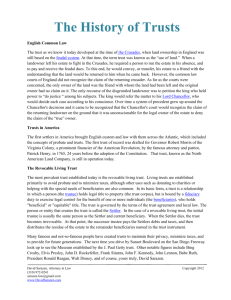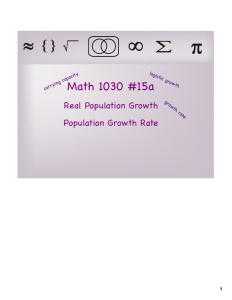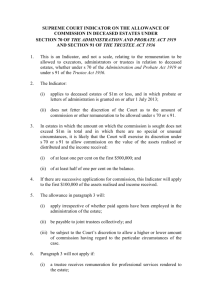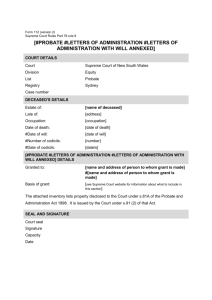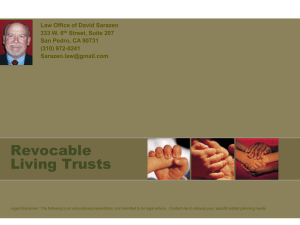ESTATES & TRUSTS I
advertisement
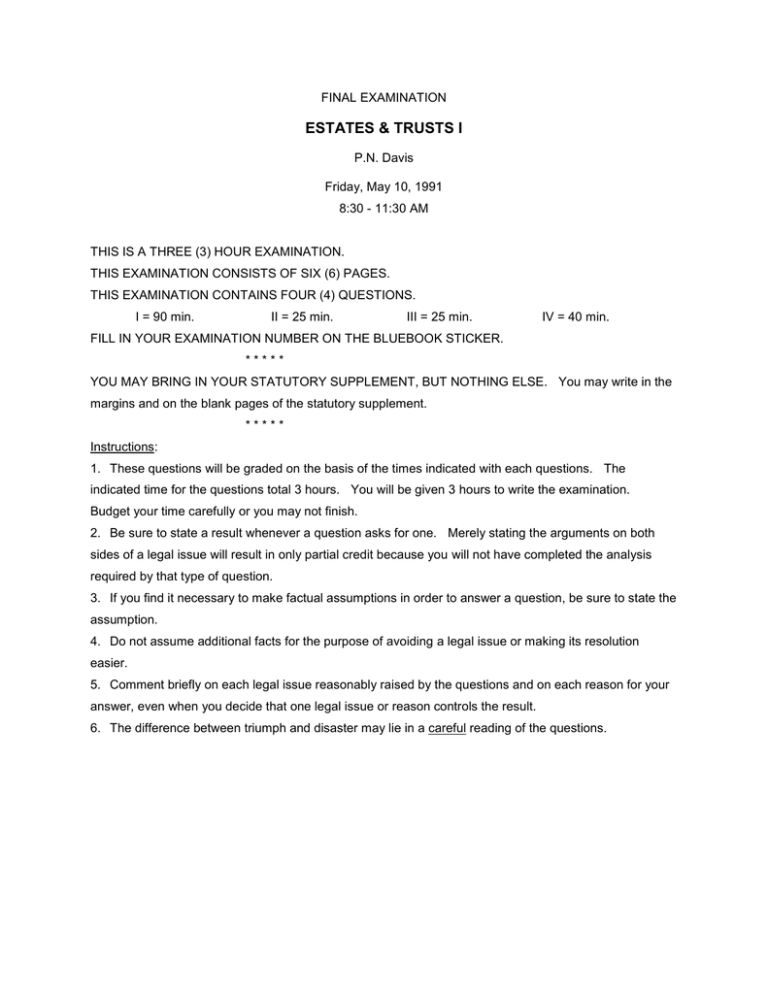
FINAL EXAMINATION ESTATES & TRUSTS I P.N. Davis Friday, May 10, 1991 8:30 - 11:30 AM THIS IS A THREE (3) HOUR EXAMINATION. THIS EXAMINATION CONSISTS OF SIX (6) PAGES. THIS EXAMINATION CONTAINS FOUR (4) QUESTIONS. I = 90 min. II = 25 min. III = 25 min. IV = 40 min. FILL IN YOUR EXAMINATION NUMBER ON THE BLUEBOOK STICKER. ***** YOU MAY BRING IN YOUR STATUTORY SUPPLEMENT, BUT NOTHING ELSE. You may write in the margins and on the blank pages of the statutory supplement. ***** Instructions: 1. These questions will be graded on the basis of the times indicated with each questions. The indicated time for the questions total 3 hours. You will be given 3 hours to write the examination. Budget your time carefully or you may not finish. 2. Be sure to state a result whenever a question asks for one. Merely stating the arguments on both sides of a legal issue will result in only partial credit because you will not have completed the analysis required by that type of question. 3. If you find it necessary to make factual assumptions in order to answer a question, be sure to state the assumption. 4. Do not assume additional facts for the purpose of avoiding a legal issue or making its resolution easier. 5. Comment briefly on each legal issue reasonably raised by the questions and on each reason for your answer, even when you decide that one legal issue or reason controls the result. 6. The difference between triumph and disaster may lie in a careful reading of the questions. I. (90 minutes total) James Horace Brown died testate on October 17, 1985. His will left the bulk of his estate to his wife of one month, Letticia Damm Brown, and appointed her executor of his estate. J.H.'s surviving son, Donald Brown, and the 2 children of his deceased daughter, Beatrice Burns, challenged the will. Events prior to death. J.H. Brown spent most of his life in Ohio, where he accumulated a relatively modest amount of property, all acquired with a substantial financial and management contribution of his first wife. On February 19, 1985, his wife of 53 years, Evelyn, died. They had 2 children (mentioned above), 4 grandchildren and 4 great-grandchildren. According to witnesses of opponents to his will, J.H. drank heavily and constantly following Evelyn's death, had frequent crying spells, repeated visited his wife's grave, tried to dig her up so that he could talk to her, had hallucinations talking to people who weren't present, and claimed that Evelyn visited him regularly at night, which frightened him into sleeping in the attic. After several months of this, in early June 1985, J.H. moved to Columbia, Missouri, and bought a house there. Later that month he told his children that he was going to marry Letticia Damm, age 35, a widow who attended the same church as he. Letticia and J.H. were married on September 10, 1985. J.H.'s children attended the wedding. J.H. and Letticia took a one-week cruise as a honeymoon. On September 27, he executed the will which is the subject of the present will challenge. He died 3 weeks later, at age 75. One week after J.H.'s death, Letticia learned from her doctor that she was one month pregnant. Witnesses for the will proponents -- acquaintances of J.H.'s in Missouri -- testified that they had never known J.H. to drink, that, while he seemed saddened by his first wife's death, he was not incapacitated by it, and that his spirits considerably improved when he met Letticia at church in the middle of July. Letticia testified that she had never seen J.H. drink or cry. Will provisions. J.H.'s will was drafted and its execution was supervised by Letticia's lawyer, and was executed in her presence. A rough draft of the text of the will was drafted after a conference between J.H. and Letticia's lawyer, in her presence, on September 23, 1985 in the lawyer's office. The draft contained the usual words of testamentary intent. It left everything to his wife Letticia Brown, except as follows. To his son Donald it gave his railroad book and photograph collections. To his daughter was given the family photographs, the family silver and china inherited by his first wife Evelyn, and the bric-a-brac collected by Evelyn. His wife Letticia was named executor. Will execution. On September 25, J.H. suffered a massive heart attack. Fearing his death, the lawyer brought the rough draft to the hospital on September 27. In his intensive care hospital bed J.H., feeling better but quite weak, read the draft, in Letticia's presence. J.H. said that he wished to make an addition to the will. At J.H.'s direction and dictation, Letticia wrote the following clause below the signature line and attestation witness signature lines: I designate my wife Letticia Brown to dispense with my personal things, such as and including furnishings, bric-a-brac, silver, china, crystal, objects of art, and my model railroad collection. Letticia wrote that clause on a dresser top opposite the foot of the bed. J.H. then wrote his signature while Letticia's lawyer held his hand. The attesting witnesses, 2 nurses, then arrived, were told by Letticia's lawyer that J.H. had signed the will, and J.H. affirmatively nodded his head, and placed their signatures on the attesting witness signature lines. J.H. then said, "Now I have no worries about future." The lawyer then said, in the presence of the nurses, that he would have the will retyped and "they would reexecute it if there is time." 1 Property at death. At his death, J.H.'s property consisted of his house in Columbia, Missouri, worth $ 150,000, a car worth $ 10,000, a life insurance policy with a face value of $ 250,000, a bank account in his own name containing $ 5,000, a joint bank account with Letticia containing $ 5,000, a railroad book collection worth $ 5,000, a railroad photograph collection worth $ 2,000, a model railroad collection worth $ 10,000, family silver & china worth $ 5,000, and miscellaneous furnishings, bric-a-brac, etc., worth $ 5,000. The beneficiaries named in the life insurance policy are "my wife Evelyn Brown, and if she should predecease me, my children Beatrice Burns and Donald Brown." Filings in probate court. The September 27, 1991, will was tendered for probate and Letticia Brown sought letters testamentary on October 25, 1985. One of the nurses testified in probate court to the events at the execution ceremony. The other nurse had quit her job at the hospital and was on the road to a new job in California and could not be located. The court granted letters on November 1, 1985, and Letticia caused statutory newspaper notice to be published on November 3, 1985. Notice was mailed to Beatrice Burns and Donald Brown, J.H.'s children, on the same day. J.H.'s son and grandchildren by his first marriage, Donald Brown and the 2 children of Beatrice Burns, filed a challenge to the validity of the will on March 15, 1986. They asserted that the will was invalid and that the estate should be declared intestate and be distributed accordingly. A. (60 minutes) Should the September 27, 1985, will be accepted for probate? Who will take under the will? What items will pass under the will? Will anyone else be entitled to share in the estate? Discuss all relevant legal issues. State a result. B. (15 minutes) If the court declares the will invalid, what share of J.H.'s property will be distributed to Letticia Damm Brown (his second wife), and to his heirs? Who are his heirs? Discuss all legal issues. State the percentage or fractional shares each person will receive. C. (15 minutes) Should Letticia elect against the will? Calculate what she would take both under the will and if she elected against the will. When must she give notice of her election? 2 II. (25 minutes) Add to Question I the following facts: On the day of his death, October 17, 1985, a sealed envelope was found in J.H. Brown's hospital room by the hospital staff. Enclosed in the envelope was a letter which stated: I hereby state that I have no children other than Beatrice Burns and Donald Brown, born of my prior marriage to Evelyn Brown. I give and bequeath nothing from my estate to them because they are able to take care of themselves. I hereby bequeath one-half of my bank accounts, stocks and bonds, and insurance proceeds to my church in Columbia, Missouri, because of the kindness and support given me by my pastor and members of the congregation. This letter was dated October 5, 1985, was in J.H.'s handwriting (albeit shaky) and was signed by him. This letter was not delivered by the hospital to Letticia Brown until two months after J.H.'s death, on December 20, 1986. Letticia did not inform either the children, the church, or the probate court of the existence of the letter when it was delivered to her. Its existence became known when discovery was had on May 10, 1986, of one of the two nurses who attested the September 27, 1985, will; during her testimony she happened to mention the letter. Shortly later, Letticia acknowledged that she had received it and tendered it to the probate court. On May 15, 1986, J.H.'s church filed a will contest seeking to admit the October 5, 1985, letter to probate. Letticia opposed the admission of the letter to probate, because, as she said, "It was insulting." J.H.'s son and 2 grandchildren also opposed its admission to probate because they thought it would be make earlier will challenge more difficult. Should the probate court grant or refuse to admit the letter to probate? Discuss all relevant issues. State a result. 3 III. (25 min.) Add the following facts to Question I (do not consider the facts in Question II): J.H. Brown telephoned Letticia's lawyer, Willard Montgomery, on October 5, 1985, and instructed him to tear up his will of September 27, 1985. J.H. added, "I want a new will because my old one is wrong. Please bring me a clean copy of my will to sign, and add a clause to give half my property to my children, Beatrice and Donald". Montgomery put the phone handset down on his desk top, pulled J.H.'s will from the file cabinet, said into the phone "I am now tearing up your will," did so, picked up the phone to continue talking with J.H., and discovered that J.H. had hung up. Montgomery wrote on the torn signature page of the will, "Torn up by direction of testator, Oct. 5, 1985. WM". Would these additional facts affect the decision of the probate court in Question I whether to admit the September 27, 1985, will to probate? Discuss all relevant issues. State a result. 4 IV. (40 minutes) On May 27, 1965, Joseph Prince, Sr., created an inter vivos trust to be administered by himself as trustee for the benefit of testator's only son, Joseph Prince, Jr. [Joey], who suffered from Down's Syndrome and had been declared legally incompetent. On that day, he sold some of his personal assets, purchased some stock in the name of "Joseph Prince, Sr., trustee for Joseph Prince, Jr.", and deposited the balance of the proceeds in a trust bank account with the same style. Settlor signed all checks drawn against that account by "Joseph Prince, trustee". The trust income and corpus was to be used for Joey's care and well-being during his lifetime. Upon Joey's death, the remainder of the trust corpus was to be divided equally among settlor's then living brothers and sisters. Settlor's wife was dead at the time the trust was created. The trust instrument, dated May 27, 1965, and signed by settlor, was found in settlor's safe deposit box after he died on July 10, 1988. Prior to that time, no family member had been aware of the trust's existence. The relevant terms of the trust are: ITEM 1. I give and convey to myself, as trustee without bond, in trust for the following uses and purposes to wit: A. I, as trustee, am authorized and empowered to invest and reinvest the said trust estate in investments, assets or property of any and every kind, including, but not limited to real property, securities of all kinds, including stocks both common and preferred, notes, indentures, mutual funds, bank and savings and loan association accounts, governmental and institutional bonds, mortgages, pledges and deeds of trust. B. After the payment of necessary expenses of the trust, including any expenses incurred by me in my duty as trustee hereunder, the income from the trust estate shall be used and expended for the use and benefit of my son Joseph Prince, Jr., during his lifetime. In this connection my trustee is authorized to pay all expenses for the care and maintenance of my said son in any institution of their choice, including the Hillside Infirmary, Hillside, Missouri, for which I hereby express a preference. Any income derived from the trust in excess of the sum necessary for such direct care and maintenance of my said son may be expended by me as trustee in any other way which will provide for the welfare, enjoyment and well being of my son or may be permitted to accumulate as part of the corpus of the trust, in my discretion as trustee. ITEM 2. I reserve the right at any time to change the beneficiary or revoke this trust. In the event this trust shall be revoked, the trust property shall belong to me in my individual capacity. During the period of the trust from its creation on May 27, 1965, to exhaustion of trust funds on June 1, 1981, settlor expended $ 35,200 for the care and maintenance of Joey at Hillside Infirmary. During that same period, the settlor provided clothing, travel, food and entertainment for Joey, and paid maintenance, taxes, insurance and repairs on the St. Louis house with their personal funds. On May 27, 1965, when the trust was created, the trust assets comprised stock. The trust assets were exhausted by 1981. Thereafter, the State of Missouri assumed the burden of Joey's institutional care. Settlor continued to pay for Joey's clothing, travel, food and entertainment expenses from personal funds until Joey's death on October 13, 1987. Settlor did not keep complete records of expenses paid by the trust. All dividends and interest received by the trust were recorded, along with cash payments to Hillside Infirmary totalling $ 35,200 5 ($ 2,200 per year). But a large number of disbursements were made to Joseph Prince, Sr., without documented explanation; they totalled $ 39,000. Settlor deposited those checks in his personal bank accounts. Many of Joey's expenses each month were paid by settlor from his personal funds. They were made during the entire 1965-1987 period. Settlor's brothers and sisters agreed in testimony that they averaged $ 50 per month for clothing, $ 35 per month for toys, $ 45 per month for personal items and $ 75 per month for travelling to the zoo, movies, restaurant meals, and the like, totalling $ 205 per month for 22 years, 4 months. Those estimated expenses totalled about $ 54,950. On August 15, 1988, settlor's brothers and sisters brought suit for an accounting and imposition of a personal surcharge against the trustee for misappropriation of trust assets. They allege that settlor breached his duties as trustee by expending $ 39,000 of trust funds for personal expenses, and that they are entitled to them as remainder beneficiaries. The State of Missouri intervened in the suit seeking $ 13,200 ($ 2,200 per year) for Joey's institutional care for the period 1981-1987 on the theory that the trust was obligated to pay those costs. Should the court require settlor to pay into the trust $ 39,000 for disbursements not documented? Discuss all relevant legal issues. State a result. 6
